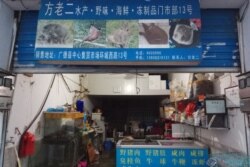Chinese officials have temporarily banned the trade of wild animals, following an outbreak of coronavirus in the central city of Wuhan.
Officials noted that they will “strengthen inspections and severely investigate and punish” violators. The ban will continue until “the epidemic situation is lifted nationwide.” They also urged the public not to eat wild animal meat.
Officials have confirmed at least 106 people have died and more than 4,500 have been infected with the virus. The virus is thought to have spread to people from wild animals sold at a market in Wuhan.
A group of 19 well-known researchers had called for the government in China to increase inspections and to enforce strong measures against wildlife markets. The researchers come from the Chinese Academy of Sciences, the Wuhan Institute of Virology and the nation’s top universities.
Meanwhile, the New York-based Wildlife Conservation Society, called for an end to wildlife markets everywhere, not just in China.
Zoonotic diseases
Zoonotic diseases are ones that can affect humans, but they first appear in other animals. They represent a large share of human infectious illnesses.
Christian Walzer is executive director of the Wildlife Conservation Society’s health program. He told the Associated Press the rise of such diseases is a “numbers game.” If these markets continue to operate and humans continue to eat the meat sold there, then the public will continue to face heightened risk from new viruses.
Researchers have not yet identified the exact source for this latest outbreak. One of the first measures Wuhan officials took was to close the Huanan Seafood Wholesale Market, where 41 of the first infections began.
Jon Epstein is an expert on the spread of diseases with the Ecohealth Alliance. He helped with efforts to find the virus that caused the 2002 epidemic known as SARS, or Severe Acute Respiratory Syndrome. The epidemic sickened more than 8,000 people and killed about 800. They linked the disease to eating the meat of wild animals carrying the virus.
Epstein said researchers suspect but have not proven that the Wuhan virus came from bats. Bats are known to carry coronaviruses, but scientists have yet to fully understand the new virus and how it moved from animals to people.
Crackdown on wildlife trade
A crackdown on wildlife trade lasted only about six months after the SARS outbreak slowed in 2003.
Only in 2014 did China make eating the meat of protected animals illegal with a law listing a maximum three-year jail term. But it also has permitted commercial farming of some animals, including tigers. Activists say this supports the illegal trade of protected animals.
Court records show that officials in Hubei, the province where Wuhan is located, investigated 250 cases related to wildlife trade in 2019 alone. Local media reported that since 2018, an estimated 16,000 wild animals were hunted in the province of more than 60 million people.
A photo of the offerings from a seller in the Wuhan market called “Wild Game Livestock for the Masses,” appeared online. It showed more than 110 kinds of animals for sale.
“The solution is simple,” Christian Walzer of the Wildlife Conservation Society said. “In the sense that we know where the problem is.”
I’m Pete Musto.
Joe McDonald, Sam McNeil, Penny Yi Wang and Elaine Kurtenback reported on this story for the Associated Press. Pete Musto adapted it for VOA Learning English. Hai Do was the editor. We want to hear from you. Write to us in the Comments Section.
________________________________________________________________
Words in This Story
outbreak – n. a sudden start or increase of fighting or disease
epidemic – adj. an occurrence in which a disease spreads very quickly and affects a large number of people
crackdown – n. a serious attempt to punish people for doing something that is not permitted
province – n. any one of the large parts that some countries are divided into






